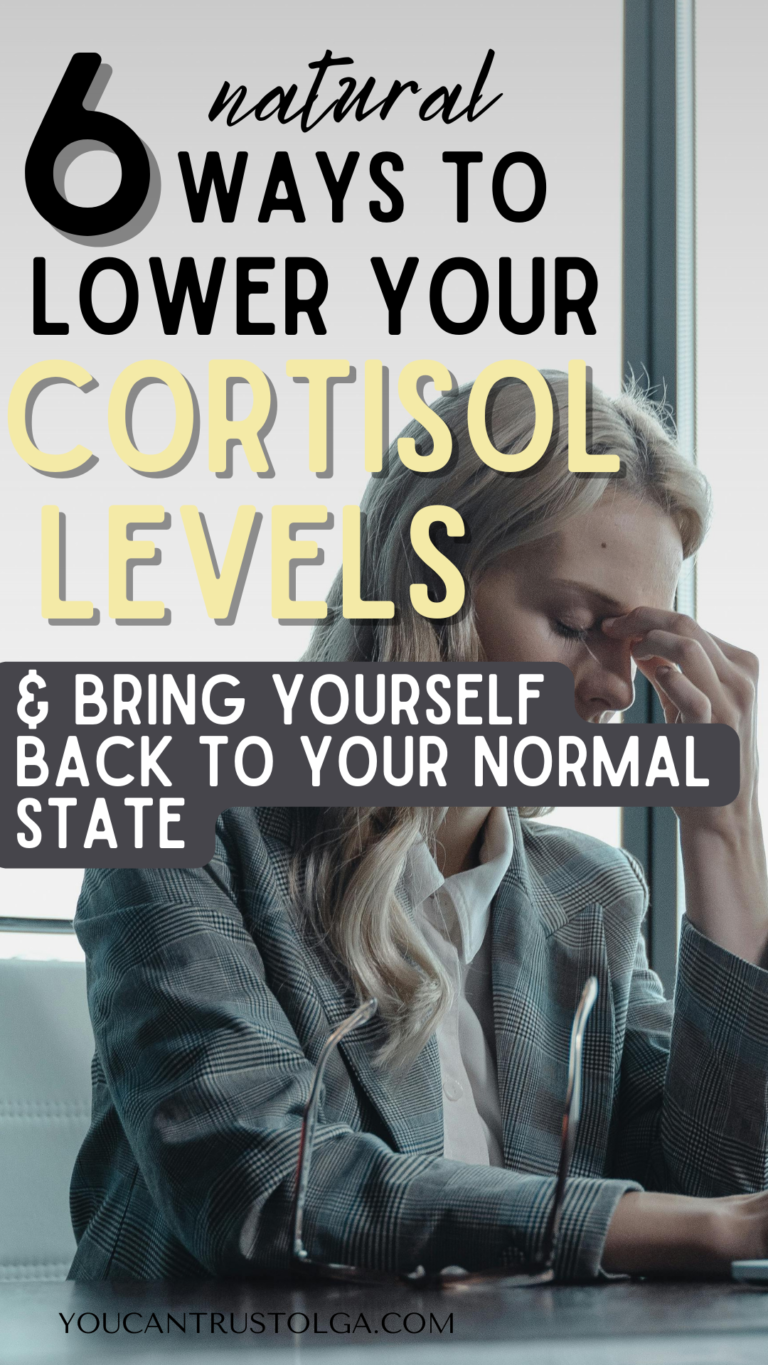Have you ever been fatigued for no reason?
Or felt anxious and stressed even when nothing particularly stressful is happening in your life?
Or have difficulty sleeping at night?
All these could be signs of elevated cortisol levels in your body. While cortisol is essential for our survival, chronically high levels can have negative effects on our health.
In this article, you will find how to manage cortisol levels naturally and bring yourself back to your normal state.

What cortisol does to our body
Cortisol is a hormone that is naturally produced by our body, specifically by the adrenal glands. It plays a crucial role in regulating our response to stress, controlling blood sugar levels, and maintaining our metabolism.
When we experience stressful situations, cortisol is released into our bloodstream as part of the fight-or-flight response. This helps us handle stress effectively, but when cortisol levels remain consistently high due to chronic stress or anxiety, it can have negative effects on our health.
High cortisol levels have been linked:
- to weight gain,
- increased blood pressure and cholesterol levels,
- decreased immunity, and
- cognitive impairment
That’s why it’s important to keep your cortisol levels balanced and at a healthy level.
Signs that your cortisol level is high
When your cortisol level is high, you can feel anxious or overwhelmed, as well as have difficulty falling or staying asleep.
High cortisol can also lead to increased cravings for sugary or fatty foods and frequent headaches.
You may also experience changes in your mood, such as irritability or depression.
Additionally, high cortisol levels can cause physical symptoms like muscle tension and pain, digestive issues, and frequent colds or infections.
How to manage cortisol levels
There are several ways to manage your cortisol levels and keep them at a healthy level. Let’s take a look at the main strategies of how to reduce cortisol naturally.
1. Cortisol friendly diet
Your cortisol levels can be influenced by your eating habits, particularly by WHAT and HOW you eat. By adjusting your diet, you can decrease the cortisol levels in your body.
There are fifteen fantastic CORTISOL-REDUCING foods that you can incorporate into your diet:
- Dark chocolate
- Avocado
- Pumpkin seeds
- Bananas
- Spinach
- Broccoli
- Probiotic yogurt
- Pears
- Red peppers
- Tuna
- Walnuts
- Eggs
- Shrimp
- Anchovies
- Sauerkraut
Here are some examples of foods that can RAISE cortisol levels:
- Hydrogenated cooking oil
- Fruit juice
- Chocolate cake
- Bread
- Cookies
- Processed meats
- Sugary snacks
HOW YOU EAT MATTERS JUST AS MUCH AS THE INGREDIENTS ON YOUR PLATE.
Eating irregularly, skipping meals, or letting yourself get overly hungry can spike cortisol because your body interprets it as stress.
Eating too fast can also trigger a stress response, making your nervous system stay in “alert” mode instead of settling.
On the other hand, steady, balanced eating patterns help keep cortisol stable. Eating every 3-4 hours prevents blood sugar crashes (which automatically raise cortisol).
Slower, mindful eating signals safety to your nervous system and supports digestion.
Pairing protein, fiber, and healthy fats at each meal keeps blood sugar steady, AND REDUCES CRAVINGS.
Especially sugar cravings.
2. Mindfulness activities
Stress management techniques like deep breathing, meditation, and yoga can help lower cortisol levels and promote a sense of calmness.
Breathing techniques, for example, are a considerable part of mindfulness practice and the fastest way to calm your mind and body. Taking a few moments to be present and focus on your breath can make a significant difference in reducing cortisol levels.
Check out the five most effective breathing exercises here.
You can also use the Pausing technique at moments of distress or before a stressful event to lower your cortisol levels and feel more relaxed. Simply by getting in the daily habit of unplugging for a few minutes, you create a mini pitstop.
Make these mindfulness activities a regular part of your life, and in a few weeks, you will be another person.

3. Aromatherapy
The practice of aromatherapy is believed to have originated in ancient China, but it has been adopted by many cultures around the world over time.
Essential oils are highly concentrated plant extracts that contain the natural aroma and properties of the plant. When used properly, they can help reduce stress, anxiety, and even boost your mood.
Lavender, chamomile, peppermint, and rosemary are some commonly used essential oils for relaxation purposes.
The best way to use aromatherapy is through inhalation, either by using a diffuser or simply adding a few drops of essential oils to a bowl of hot water and inhaling the steam.
You can also dilute essential oils with carrier oils like coconut oil and apply them topically to your skin for targeted relief.
Dream Essential Oil Blend
Ideal for Aromatherapy, the Dream Essential Oil Blend boasts a serene and calming aroma that promotes relaxation, tranquility, and equilibrium. Made with pure essential oils ONLY - 100%
4. Regular exercising
You thought I wouldn’t mention it, but honestly, this should be THE NUMBER ONE piece of advice for those who struggle with elevated levels of cortisol in their body.
Regular exercise is a straightforward panacea for stress-related cortisol imbalance. It can help you alleviate anxiety and depression and improve your overall mood.
Physical activity (no matter how strenuous it is) prompts the release of feel-good chemicals in the brain called endorphins. These are natural painkillers that also promote better sleep quality, boost self-esteem, and decrease stress levels.
Additionally, exercising regularly can provide a much-needed distraction from everyday worries and responsibilities.
5. Somatic therapy
Now, somatics are my personal favourites.
Somatic therapy is a form of therapy that focuses on the mind-body connection. It involves using physical movements, sensations, and breathing exercises to help release tension and trauma stored in the body.
When you perform somatic exercises, you activate the vagus nerve.
Why is it important?
Cortisol and the vagus nerve are both part of your stress-response system, but …they work on opposite sides of it.
THINK OF CORTISOL AS A STRESS ACCELERATOR.
When your brain senses stress, it sends signals to release cortisol. This puts your body into “handle it now” mode: higher heart rate, more alertness, tighter muscles, faster breathing, and more inflammation over time.
VAGUS NERVE IS YOUR SYSTEM’S STRESS BREAK.
It controls the parasympathetic nervous system, which is responsible for calming you down. When the vagus nerve is activated, it lowers heart rate, relaxes the body, slows breathing, and sends a “we’re safe” signal to the brain.
Chronic stress increases cortisol so much that it reduces vagus nerve activity, which then keeps cortisol high. It becomes a loop.
Activating the vagus nerve – through breathing, somatic exercises, cold exposure, humming, stretching, or devices like Pulseto or Sensate – sends a signal to the brain that downshifts cortisol production.
Somatic therapy is definitely one of those tools that start the chain reaction towards lowering cortisol.
If you’re interested to learn more about somatics, check out this dedicated article.
6. Natural Supplements
Using natural supplements for elevated cortisol levels can also be helpful. Supplements such as ashwagandha, omega-3, and magnesium have been shown to have calming effects on the body and mind.
Additionally, incorporating adaptogenic herbs like rhodiola or ginseng in to your daily routine can also help regulate cortisol levels and reduce stress. These supplements work to balance the body’s response to stress, allowing for better relaxation and improved sleep.






